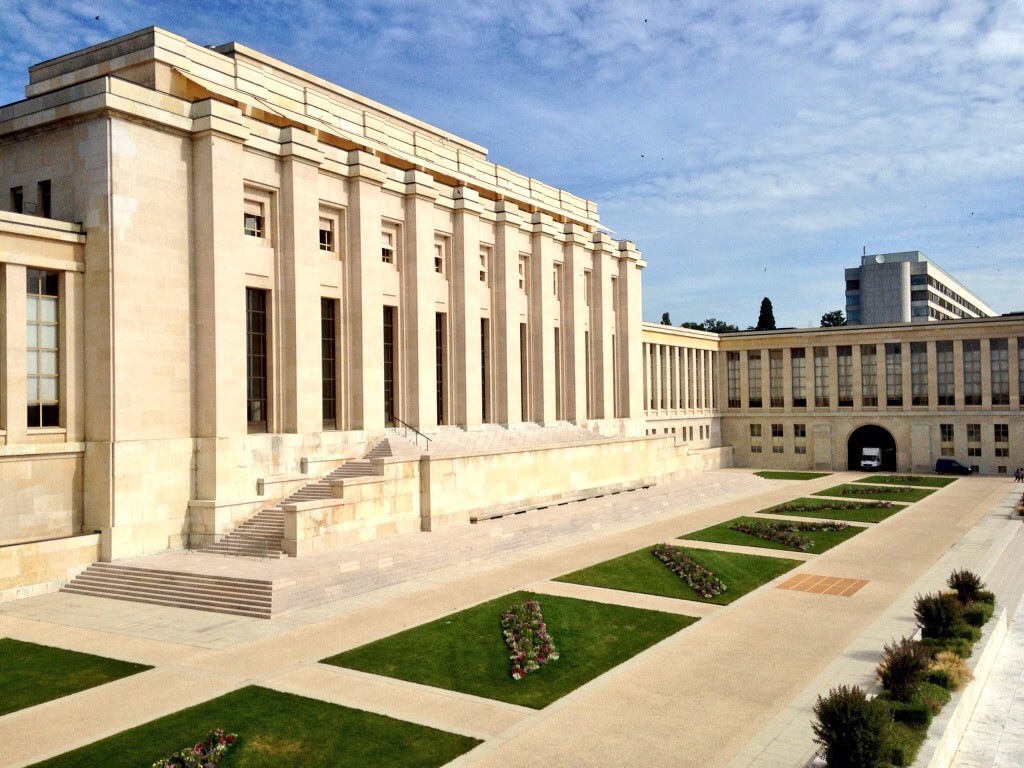From 14 September to 2 October 2015, Americans for Democracy & Human Rights in Bahrain (ADHRB) engaged the 30th Session of the United Nations Human Rights Council (HRC) in Geneva to raise awareness of ongoing human rights violations in Bahrain, Saudi Arabia, and other Gulf Cooperation Council (GCC) States. ADHRB met with dozens of United Nations (UN) Member States, NGOs, UN officials and Special Procedures. Additionally, ADHRB hosted two side events and conducted a series of interventions before the Council.
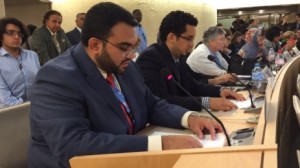 On 14 September, the HRC’s opening day, ADHRB welcomed a joint statement issued by Switzerland on behalf of 34 nations that raised the international community’s persistent concerns regarding ongoing human rights abuses in Bahrain. The statement was the 5th of its kind issued by UN Member States since 2012, demonstrating the international community’s continued attention to human rights violations within Bahrain (click here for full text of the statement).
On 14 September, the HRC’s opening day, ADHRB welcomed a joint statement issued by Switzerland on behalf of 34 nations that raised the international community’s persistent concerns regarding ongoing human rights abuses in Bahrain. The statement was the 5th of its kind issued by UN Member States since 2012, demonstrating the international community’s continued attention to human rights violations within Bahrain (click here for full text of the statement).
That day, ADHRB delivered two oral interventions that called the Council’s attention to human rights violations in Bahrain and the GCC. ADHRB’s Husain Abdulla delivered an intervention on the case of Mohammed al-Ajami, a writer imprisoned by the Qatari government for the opinions expressed in his poetry. Also that day, BIRD’s Sayed Alwadaei welcomed the Swiss-led joint statement on Bahrain, while drawing attention to the partiality of Bahrain’s national human rights mechanisms.
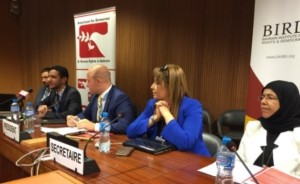 On 15 September, ADHRB, BIRD, the Bahrain Center for Human Rights (BCHR), the Bahrain Human Rights Society (BHRS), Human Rights Watch (HRW), and a series of other international human rights NGOs co-sponsored a side event: Counter-Resolutionaries: Bahraini Obstinance at the HRC. Panelists included BIRD’s Sayed Alwadaei, BCHR’s Nedal Alsalman, BHRS’ Nuha Hassan, and HRW’s Philippe Dam. ADHRB’s Michael Payne moderated. The panel focused on Bahraini resistance to reforms requested by the HRC. Ebrahim Demestani, a medic jailed by Bahraini authorities for three years for treating injured demonstrators, also gave remarks from the audience about his time in jail.
On 15 September, ADHRB, BIRD, the Bahrain Center for Human Rights (BCHR), the Bahrain Human Rights Society (BHRS), Human Rights Watch (HRW), and a series of other international human rights NGOs co-sponsored a side event: Counter-Resolutionaries: Bahraini Obstinance at the HRC. Panelists included BIRD’s Sayed Alwadaei, BCHR’s Nedal Alsalman, BHRS’ Nuha Hassan, and HRW’s Philippe Dam. ADHRB’s Michael Payne moderated. The panel focused on Bahraini resistance to reforms requested by the HRC. Ebrahim Demestani, a medic jailed by Bahraini authorities for three years for treating injured demonstrators, also gave remarks from the audience about his time in jail.
On 16 September, top-level ADHRB and BIRD staff held a private meeting with Prince Zeid Ra’ad Al Hussein, the UN High Commissioner for Human Rights. The conversation touched upon the human rights situation in Bahrain and the progress of human rights regionally.
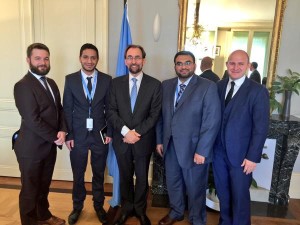 On 17 September, BCHR’s Nedal Alsalman participated in an Interactive Dialogue on enforced disappearance and discussed the Bahraini security force’s ongoing enforced disappearance of dissidents. ADHRB advocacy associate Eric Eikenberry also participated in an intervention highlighting Bahrain’s hiring of foreign nationals to staff its internal security forces.
On 17 September, BCHR’s Nedal Alsalman participated in an Interactive Dialogue on enforced disappearance and discussed the Bahraini security force’s ongoing enforced disappearance of dissidents. ADHRB advocacy associate Eric Eikenberry also participated in an intervention highlighting Bahrain’s hiring of foreign nationals to staff its internal security forces.
Later that day, ADHRB, alongside the European Saudi Organization for Human Rights (ESOHR), ALQST, Amnesty International, BIRD, the World Organization against Torture (OMCT), and a multitude of other international NGOs co-sponsored a side event entitled Torture in Saudi Arabia. Panelists included ADHRB’s Eric Eikenberry; Zena al-Esia, researcher at ESOHR; and Sevag Kechichian, researcher on Saudi issues at Amnesty International. Gerald Staberock, the Secretary-General of OMCT, moderated. The panelists discussed the systemic use of torture within the Saudi criminal justice system. ALQST’s Yahya Assiri joined the panel via Skype to provide a video presentation on torture in Saudi Arabia. ESOHR’s Ali al-Dubaisy then related his personal experience as a one-time prisoner of conscience inside Saudi jail.
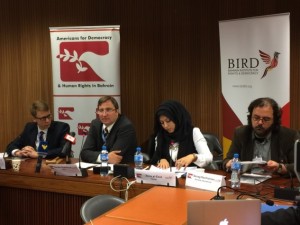 On 18 September, ADHRB delivered another round of interventions. First, Mr. Demestani directed the Working Group on arbitrary detention’s scrutiny towards the Bahraini government’s ongoing practice of arbitrary detention. Later that day, ADHRB Executive Director Mr. Husain Abdulla encouraged the Council to consider the arbitrary detention of four Saudi princesses – Sahar, Jawaher, Hala, and Maha Al Saud – for supporting the rights of Saudi women.
On 18 September, ADHRB delivered another round of interventions. First, Mr. Demestani directed the Working Group on arbitrary detention’s scrutiny towards the Bahraini government’s ongoing practice of arbitrary detention. Later that day, ADHRB Executive Director Mr. Husain Abdulla encouraged the Council to consider the arbitrary detention of four Saudi princesses – Sahar, Jawaher, Hala, and Maha Al Saud – for supporting the rights of Saudi women.
ADHRB-led interventions continued during the second and third weeks of the session. On 22 September, ADHRB’s Mr. Eikenberry spotlighted the prevalence of torture within the Saudi legal system. BIRD’s Mr. Alwadaei drew attention to the human rights crisis in Bahrain, focusing in particular on the imprisonment of human rights defenders like Abdulhadi al-Khawaja, Abduljalil al-Singace, and Naji Fateel.
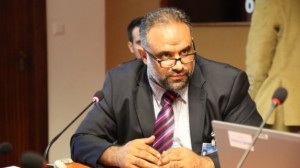 On 24 September, ADHRB delivered three interventions. Mr. Payne spoke on corruption within Bahrain’s government during a panel on Good Governance in Public Service. Later in the day, Mr. Eikenberry detailed GCC governments’ failure to engage with the UN Special Procedures or accept country visits from UN human rights mechanisms. Mr. Payne also outlined the Bahraini government’s failure to engage with the UN Special Procedures, in particular its refusal to cooperate with the Working Group on arbitrary detention.
On 24 September, ADHRB delivered three interventions. Mr. Payne spoke on corruption within Bahrain’s government during a panel on Good Governance in Public Service. Later in the day, Mr. Eikenberry detailed GCC governments’ failure to engage with the UN Special Procedures or accept country visits from UN human rights mechanisms. Mr. Payne also outlined the Bahraini government’s failure to engage with the UN Special Procedures, in particular its refusal to cooperate with the Working Group on arbitrary detention.
On 28 September, ADHRB delivered two further interventions. Mr. Payne delivered a message from imprisoned Bahraini opposition leader Fadhel Abbas, who raised the issue of the curtailment of free expression both in Bahrain and globally. Later that day, Isabel Cerda Marcos, advocacy associate at the European Centre for Democracy and Human Rights (ECDHR), ADHRB’s Brussels-based sister organization, drew the HRC’s attention to the cases of GCC human rights defenders who have been punished for speaking about the human rights situations of their respective nations at international forums.
On 30 September, ADHRB gave its final interventions of HRC 30. Speaking on behalf of ADHRB, ECDHR’s Ms. Marcos highlighted the Saudi government’s ongoing but limited technical cooperation agreement with the OHCHR. Then Bahraini human rights attorney Mohamed al-Tajer urged Bahrain to fulfill its promises to promulgate its own technical cooperation agreement with the OHCHR.
Click here to read as a PDF.


